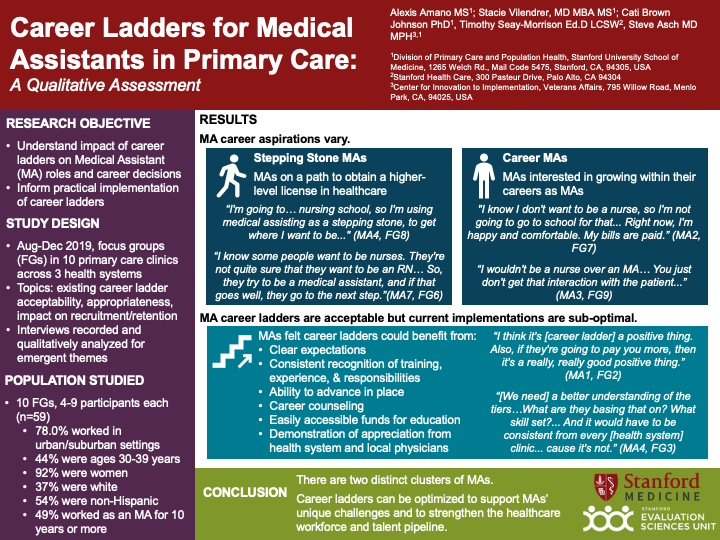PCR016: Career Ladders for Medical Assistants in Primary Care: A Qualitative Assessment
Alexis Amano, MS; Steven Asch, MD, MPH; Timothy Seay-Morrison; Stacie Vilendrer, MD, MBA; Cati Brown-Johnson, PhD
Abstract
Objective: This assessment aims to fill this gap with qualitative analysis of MA focus groups discussing career ladders implemented at three institutions.
Study Design: MA perspectives of existing career ladders within their institutions were assessed through a series of semi-structured focus groups. MA perspectives related to the acceptability, appropriateness, and impact on recruitment and retention of existing career ladders within their institutions were discussed, recorded, and qualitatively analyzed.
Setting: Sites included primary care clinics in three health organizations across urban, suburban and partially rural U.S. geographies in California and Utah during August to December 2019.
Population Studied: Across the three institutions, ten focus groups were conducted with 4 to 9 participants each for a total of 59 participants. Most MA participants (78.0%) worked in urban/suburban settings, 44% were 30-39 years of age, 92% were female, 37% were white, and 54% were non-Hispanic. Nearly half had worked as an MA for 10+ years.
Outcome Measures: MA career ladders are acceptable but current implementations are sub-optimal.
Results: MAs’ decisions to join and remain in a given role are influenced by a number of factors, with opportunities for economic and professional growth predominating. MA career aspirations varied, with “stepping stone” MAs using their role to advance into other health professions and “contented career” MAs hoping to grow within their MA career. Career ladders were acceptable in theory but MAs felt current implementations could benefit from clear and transparent expectations for advancement, consistent recognition of training, experience and work responsibilities across the organization, the ability to advance in place, and career counseling.
Conclusion: MAs held positive perceptions of career ladders yet recommended a number of improvements to their practical implementation. The emergence of two distinct clusters of MA professional needs and desires suggests an opportunity to further optimize career ladders to support their unique challenges to strengthen the healthcare workforce and talent pipeline.

Jack Westfall
jwestfall@aafp.org 11/19/2021Great poster and abstract. Thanks